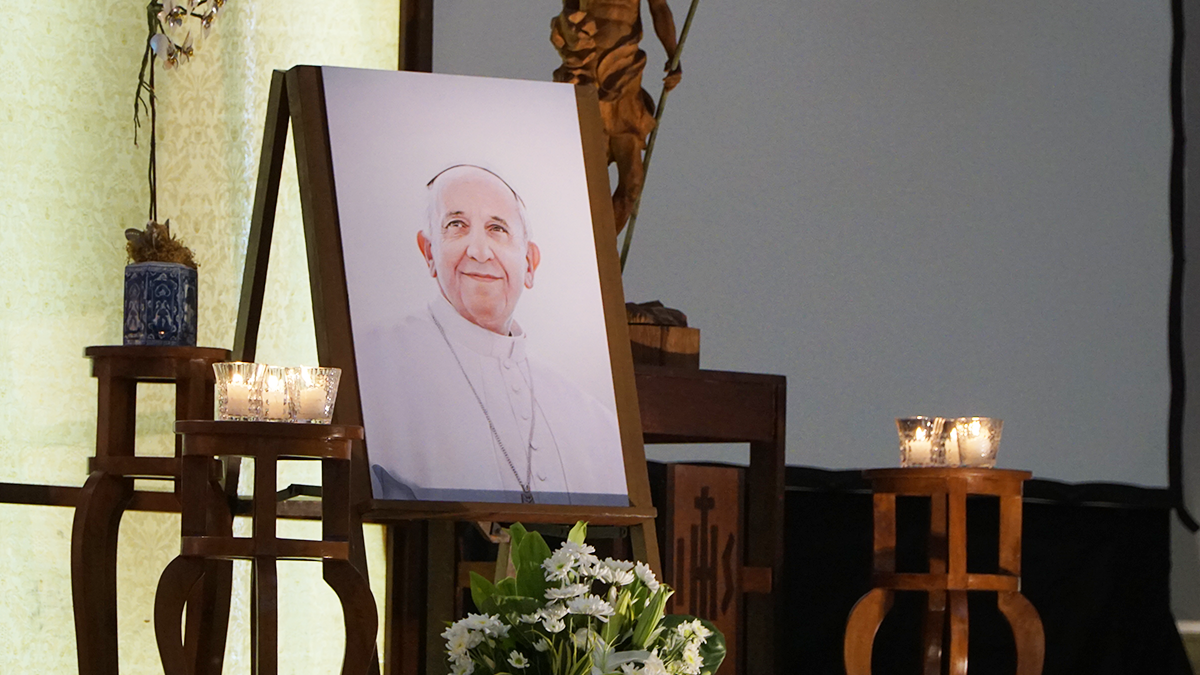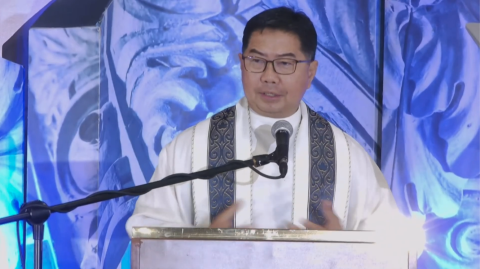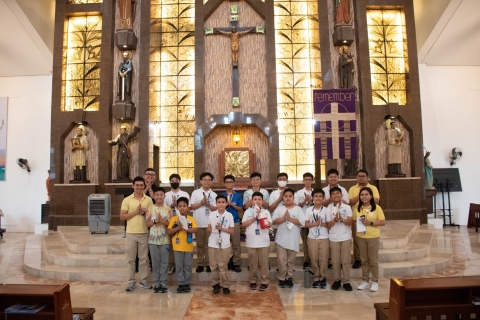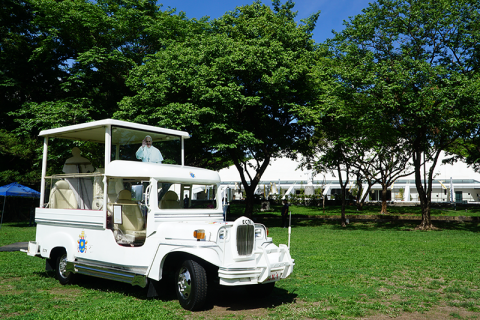Homily: Memorial Mass for Pope Francis at the Jesuit Residence, by Fr Bienvenido Nebres SJ
29 Apr 2025 | Fr Bienvenido Nebres SJ
Homily by Fr Bienvenido Nebres SJ during the Memorial Mass for Pope Francis at the Jesuit Residence on Thursday, 24 April 2025.
In this, our memorial mass for our brother Jesuit, Pope Francis, I would like to offer two points for reflection.
First, to invite us to reflect on him as one who simply sought to be a follower of Jesus, as Ignatius and our First Fathers were and as Francis of Assisi was, whose name he chose as Pope.
Pope Francis is best known and loved for his love for all, especially for the poor, the excluded, the unloved:
- like the disfigured man from whom people averted their gaze, but whom Francis kissed and embraced. The man said he felt healed by Pope Francis’ love and embrace.
- like the migrants from Africa to Europe dying unwanted on flimsy boats in the Mediterranean.
- like the prisoners, including Muslim women, whose feet he washed on Holy Thursday.
This was his following of Jesus who was criticized by the leaders of his time for walking with tax collectors, prostitutes, and sinners – the excluded of Jesus’ time.
It was not being progressive or conservative. It was to follow Christ as leader of Christ’s Church. The world wants to box him into categories of progressive or conservative. But that was not his position. Neither should it be ours. It should be how to be faithful in our following of Jesus.
First, in his person and personal lifestyle. After his election, we all remarked on how he kept his old black shoes, his silver pectoral cross as Archbishop, not the usual gold papal pectoral cross. He refused the expensive papal limousine.
Austen Ivereigh comments: “They were not mere gestures nor were they calculated messages. These flowed from his identification with Christ of the Gospels.”
He chose to live in the Casa Santa Marta because he wanted to be approachable to people, to be near them, available to them as Jesus was.
With the leaders and powerful of his time, Jesus was especially critical of the religious leaders, the Scribes and Pharisees. We all remember Pope Francis’ talk to the Vatican curia in December 2014, where he listed 15 sicknesses of the leaders of the Church.
Among them were “the pursuit of material wealth,” “the pursuit of power and influence, pride, vainglory and feeling indispensable.” Reminding us of the Meditation on the Two Standards.
We can see then that the major challenges he engaged as chronicled in Ivereigh’s second book, “Wounded Shepherd,” were to confront the temptation to riches, as can be seen in the scandals with the Vatican Bank. The temptation to honor, power, influence, which we see in what he called “careerism.” The meditation on the Two Standards reminds us that these temptations lead to pride and from pride to all the vices. Sadly these occurred in the Vatican curia Pope Francis struggled to reform.
The invitation is for us Jesuits to see the choices and priorities in Pope Francis’ life as guided by the Gospels and the Spiritual Exercises.
The second point for reflection is how God writes straight with crooked lines. How Jorge Bergoglio became a sign of contradiction to the Jesuits of Argentina and to our Jesuit leadership in Rome. This brought him into walking his Via Crucis. But this was actually the path God chose for him to follow to prepare him to be the Shepherd of His Church.
Jorge Bergoglio was actually a sort of superstar in his early years of mission. He was made novice master right after tertianship (a year after ordination) and then provincial three years later. Then rector of the scholasticate. This, together with his charism as leader, gave him great influence among the younger generation of Jesuits. However, the formation program he led was not in accord with the dominant view of what we might call the progressive, liberation theology of the leaders of the Latin American Church. His formation program insisted on closeness with the pueblo, the people mostly poor, in the literature scholastics read, in their ministries. He had the scholastics raising pigs and chickens to help feed the poor around them and led them in regular encounter with their poor neighbors.
To the Jesuit social action leaders in Buenos Aires, this was a throwback to a ministry of doleout charity and not the promotion of justice. This divided the Argentinian Jesuits – into the younger generation, formed by Jorge Bergoglio and who loved and admired him and the Jesuits in the social apostolate and eventually the Argentinian Provincial and our leadership in Rome. It came to a point where Jesuit leadership did not know what to do with him.
And he was sent into exile in Cordoba, where he had no Jesuit assignment. It was a time of darkness and desolation. It was also a time of purification. He softened from the hard-headed provincial and superior he had been. It was a time of great interior crisis, he later told Fr Spadaro. He slept badly and ate little, he grew agitated and fragile and spent hours staring out of the window. He saw the new leadership of the province dismantle his work of formation and scatter the next generation of leaders he nurtured to different places.
Ivereigh writes: “It was an experience of powerlessness that brought him like nothing before in his life into the perspective of the poorest.” Like them he could only be patient, trust in the Lord and take each day as it comes.
God’s instrument in restoring him was then Archbishop Quarracino of Buenos Aires. Archbishop Quarracino admired Bergoglio’s rapport with the younger Jesuits and other young priests. He was impressed with his love and care for the poor. He was not quite sure why Jesuit superiors had problems with him, but he saw Bergoglio as precisely the leader he needed for Flores, a poor area of Buenos Aires. Quarracino had formed a team of young priests for this ministry among slum dwellers. He needed Jorge Bergoglio to lead and support them.
So he maneuvered to have Fr Bergoglio appointed Auxiliary Bishop and eventually Coadjutor Archbishop with right of succession. Bergoglio continued to live in the Provincial house. Initially it was okay, but the provincial became uncomfortable with his presence, perhaps because he had such great influence on the young Jesuits, and eventually had Fr Kolvenbach write a letter asking Jorge to leave the Jesuit house. This must have hurt, because Archbishop and later Cardinal Bergoglio never again entered a Jesuit house, until he became Pope.
But he harbored no resentments. After he was elected Pope, he immediately reached out to Fr General Nicolas, had dinner at our Jesuit Curia and we know he visited Jesuit houses in all his many papal travels. He became our Pope, our Jesuit brother Pope.
We are saddened at his loss. But grateful that God gave him to us for over 12 years. He has shown us how it is to live as followers of Christ both in our personal lives and in our mission of leadership. May he pray for us that we seek to follow Christ as faithfully as he did – in our personal lives and in our carrying out of mission.




